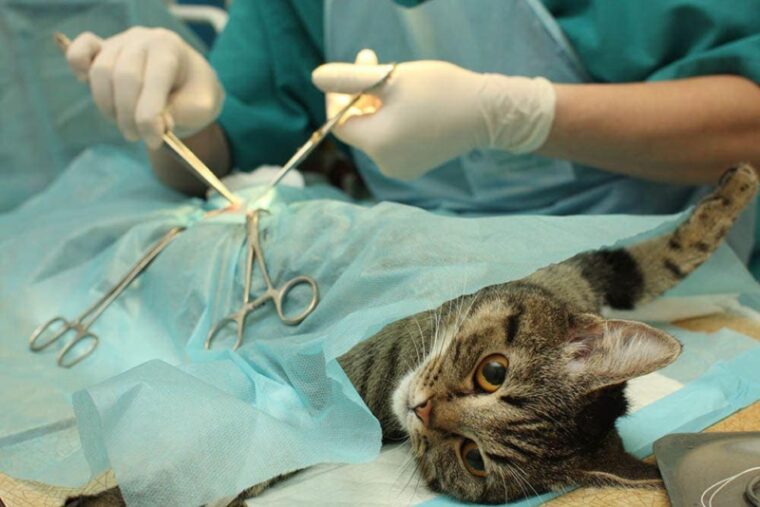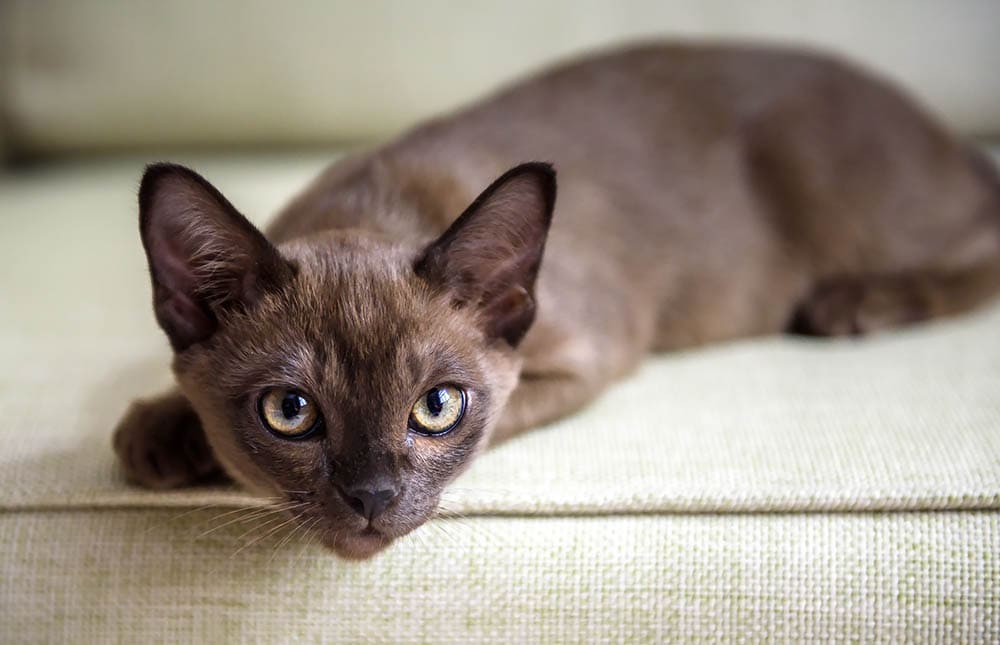
Anesthesia is advantageous for cats undergoing surgical procedures because it temporarily renders them unconscious in a controlled setting, making them unaware of their surroundings and protecting them from feeling pain during the operation. Whenever anesthesia is involved, however, there are certain risks to be aware of. One is that it impairs the part of the brain and nervous system responsible for the swallowing reflex. If a cat regurgitates or vomits a belly full of food while under anesthesia, they will be unable to protect their airways because they cannot swallow, and they risk breathing stomach contents into their lungs.
Why Is Fasting Before Surgery Necessary for a Cat?
Fasting is necessary to prevent surgical complications, such as regurgitation or vomiting of stomach contents. When a cat is under general anesthesia, the nervous system is depressed and the cat is temporarily unconscious. While in this state, the cat also loses the ability to swallow. Swallowing is a normal reflex in all mammals and serves two necessary functions:1
If a cat vomits or regurgitates food during their unconscious state, the contents may travel down the trachea and into the lungs, leading to aspiration pneumonia. The cat’s ability to swallow and protect their respiratory tract is impaired while under anesthesia. Additionally, the stomach acid from regurgitated food or gastrointestinal reflux can irritate the esophagus (esophagitis), causing scarring of the delicate tissue, which can lead to a stricture or narrowing of the esophagus. If the esophagus has a stricture, food and sometimes water will not pass as easily through it to the stomach.

What Are Current Fasting Recommendations for Cats Prior to Spay or Neuter Surgery?
The common fasting recommendation for cats is “no food after midnight the night before surgery.” Realistically, though, fasting recommendations for cats can vary greatly between clinics and veterinarians, as there’s a lack of clear-cut evidence for supporting a specific fasting protocol.2 Long fasting times may not guarantee the complete emptying of a cat’s stomach before anesthesia.3 Cats that are stressed, eat large meals, and consume dry diets (lack of moisture in kibble) may cause food to empty more slowly from the stomach.
Recommendations for fasting your cat before surgery are always at your veterinarian’s discretion. Factors that your veterinarian will take into consideration include your cat’s breed, age, sex, size, and current health status. The American Animal Hospital Association (AAHA) and the American Association of Feline Practitioners (AAFP) have similar but differing recommendations for fasting cats before surgery.
AAHA guidelines suggest that healthy adult cats should fast 4 to 6 hours prior to anesthesia. Kittens under 8 weeks of age should not go without food any longer than 1–2 hours, as they are at risk for hypoglycemia (low blood sugar). Withholding food from diabetic cats is recommended for no longer than 2–4 hours before surgery. Cats with a high risk of regurgitation or those with a history of regurgitating/vomiting while under anesthesia should be fasted for 6–12 hours to minimize their danger as much as possible. AAHA guidelines also recommend that veterinarians consider feeding cats in the high-risk category 10%–25% of their normal breakfast 4–6 hours prior to anesthesia.
AAFP recommends fasting cats no longer than 3–4 hours prior to anesthesia, though it’s up to the veterinarian’s preference and judgment.
Is Water Withheld Before Anesthesia?
Water is generally okay to offer your cat overnight and on the morning of surgery. AAHA recommends not withholding water from healthy adult cats, kittens, and diabetic cats before surgery. Water may be withheld for 6–12 hours for cats at high risk of regurgitation. AAFP suggests that “water should be available until the time for premedication.” Since recommendations can vary, it is always best to seek your veterinarian’s advice about offering water prior to the surgery.

Summary
Cats should be fast before spay or neuter surgery to prevent anesthesia complications such as vomiting, regurgitation, and gastrointestinal reflux. These actions while under anesthesia can lead to serious problems such as aspiration pneumonia and esophagitis. Fasting recommendations can vary depending on your cat’s breed, sex, size, age, and current health issues. The AAHA and the AAFP have published guidelines for fasting cats prior to anesthesia. However, pre-surgical instructions are always at your veterinarian’s discretion, and any questions or concerns that you may have about your cat before surgery can be answered by them.
Featured Image Credit: De Visu, Shutterstock








